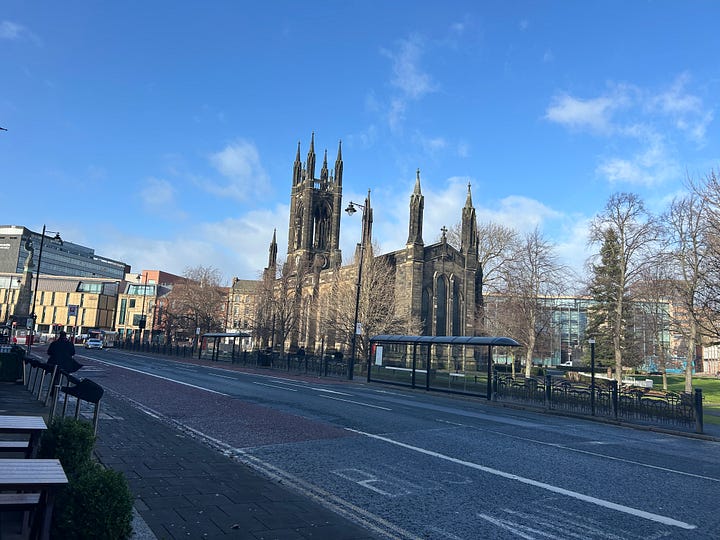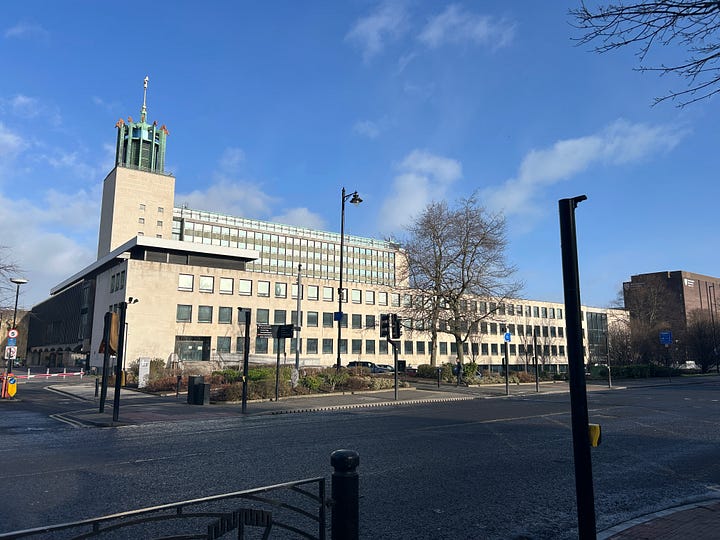"You first, pops!"
An uplifting day in court for Andrew Stephenson in his battle with Northern Powergrid
The headline is a passing comment to litigant Andrew Stephenson by a stranger, as we left the pub today after a successful court hearing. It nicely summarises the day’s outcome for this legal pioneer. The essence of the story is that Andrew lawfully tried to use an energy micro supplier, only to have the “big boys” engage in mafia tactics, and physically sever him from the grid as punishment. He has been on an emergency diesel generator for two years, nonstop, as he has had no remedy via the courts for this injustice, which (until today) have instinctively sided with the authorities no matter what the facts or law.
Northern Powergrid (NPG) even left his house in an unsafe condition by severing the earth connection, resulting in shocks when showering! Not the kind of PR they want in the tabloid newspapers, where the story belongs. At today’s hearing was a high-flying barrister with impeccable academic credentials acting for NPG, as well as a solicitor and legal assistant, so the stakes are high. The case has extra significance when you realise that the billing companies (like Octopus) are really credit brokers, not genuine suppliers, issuing statements, not genuine bills, using deemed contracts that do not apply to residential customers, only genuine businesses. In other words, criminal fraud at scale.
Today’s hearing in Newcastle was presided over by Judge Alexandra Withers, who in my estimation deserves her “rising star” accolade. She upheld the law without fear or favour, in the face of a powerful corporate interest that was trying to intimidate and dominate her to get their way. There were no special favours — the case actually went against Andrew on technical procedural grounds. Where NPG came unstuck was the costs order, in a similar manner to my own battle with TV Licensing, where greed and overreach have come to bite them. Underlying these matters is a spiritual battle, where some of our best and brightest are drawn to the law, only to be co-opted into a struggle against the people.


Summaries of previous articles on Andrew’s situation
I have written previously on the case, so I asked my friend ChatGPT to summarise each article. Skip this section if you want to get to today’s court drama.
Man vs Contract: English Energy Gangsterism — 25th February 2023
Andrew Stephenson’s troubles began when he lawfully switched energy suppliers to a confidential micro-supplier, but Octopus Energy refused to recognize the switch. Misusing court processes, Octopus obtained a fraudulent warrant to disconnect Andrew, claiming he owed them money despite no contract. Northern Powergrid compounded the injustice by physically cutting Andrew’s connection to the grid, even severing the earth cable, leaving his home unsafe and forcing him to rely on an expensive and hazardous diesel generator. This situation underscores systemic corruption in energy utilities and courts.Ten Months on a Diesel Generator (and Counting) — 7th December 2023
After ten months without mains electricity, Andrew remains reliant on his diesel generator while battling an entrenched and corrupt system. Octopus and Northern Powergrid acted unlawfully, ignoring due process, fabricating evidence, and leaving Andrew’s home in a dangerous state. Despite escalating the matter to the courts, justice has been elusive, with systemic failures and judicial bias compounding his plight. The case highlights not just Andrew’s suffering but broader issues of access to justice and corporate malfeasance in essential utilities.Update on Legal and Freedom Projects — 30th December 2023
Andrew’s case against Northern Powergrid continues, as he appeals the biased rulings and procedural errors that have left him powerless. Despite following regulations to switch suppliers, he faces systemic roadblocks, including negligent judicial oversight and unlawful acts by utility companies. His struggle represents a wider fight against corporate overreach and a legal system that fails to protect individuals, exposing significant flaws in how justice is administered for litigants in person.People Think I Don’t Care, But I Do — 13th April 2024
A meeting between Andrew and his MP, Jill Mortimer, brought new attention to the injustices he has faced. Mortimer expressed disbelief at the egregious failures by Northern Powergrid and Octopus, including cutting Andrew’s supply cable without cause. Despite systemic failures, Andrew’s persistence in exposing these abuses continues to shine a light on the corruption and indifference pervading both corporate and legal systems. His story exemplifies how far the rule of law has strayed from its intended purpose.Judge Recuses Himself from TV Licensing Case — 7th January 2024
As an observer in court, Andrew witnessed judicial bias firsthand in his appeal against Northern Powergrid. The judge disregarded critical issues like standing, equity, and procedural fairness, favouring corporate interests over Andrew’s rights. This judicial mishandling mirrors broader patterns of institutional corruption and bias seen in similar cases with the same judge. Andrew’s persistence in pursuing justice highlights the immense challenges faced by individuals standing against powerful entities with systemic advantages.
Yesterday’s hearing for adjournment
There was a previous hearing yesterday as Andrew had applied to have the NPG costs process adjourned, as he is working full-time to aid a close friend whose child has suffered a terrible fate at the hands of the medical cartel. This was on humanitarian grounds, as he is genuinely needed elsewhere, confronting criminal acts on an epic scale by trusted authorities. Permission was denied by a different judge, but this ended up being Andrew’s saving grace, as we shall see later.
Today’s hearing to set aside a costs order
Today’s hearing was to appeal a previous order, made without Andrew’s knowledge or involvement, that permitted NPG to pursue their costs for the original injunction hearing (that Andrew lost). This had been put on hold due to the appeal process that was denied, including seeking judicial review, which was turned down. (I never did get to write about that part, another day!) Thus far there have been 22 court orders in this case, so Andrew’s commitment is exemplary. Very few people could withstand the pressure of being physically disconnected from the power grid, an essential utility, for this long and at the same time conducting complex legal affairs without representation. NPG had hoped he would buckle long ago and back down, but he refuses to do so.
Andrew’s arguments about due process and case allocation were essentially moot, as the judge (correctly) identified this as not being a “live” case and hence outside her remit for the day. That the case was not previously assigned to being a “small claim” as it should have been, insulating Andrew from any costs order, belongs in a different “legal box”. So if he and NPG cannot agree it is a small claim, then a formal costs determination hearing would have to be held, where the costs are potentially “zeroed out” on that basis. So Andrew is likely “right (that no money is due to their lawyers), but not right here and right now in this room”. As rookies to the legal game, we have to learn the scope of action each judge has at each stage of a case, and this takes time.
Greed and overreach boomerang on NPG
Strictly speaking, Andrew made a procedural error when filing this appeal, and hence was liable for any costs, since he lost. The other side was probably aware of this, being professionals at “the game”. So their assumption was they could hurt Andrew with a heavy costs bill for a 45 minute hearing, discouraging him further from exposing their wrongdoing. However, they decided to belatedly claim for the previous day’s hearing, where they were not in attendance, but had simply emailed the court. They asked for £6,980 (about US$8,700) on a flawed basis that was dangerously close to being fraudulent.
The judge rightly refused costs as the paperwork was wrong, and this is where the other side then made an epic mess-up. They essentially challenged the judge’s authority when seeking permission to appeal, claiming she had exceeded her discretion, which is tantamount to an accusation of being insane or incompetent. She came down on them hard, and the NPG barrister left the room looking red-faced. Our sense is that he is a good man feeling conflicted by representing his client on this matter, although his legal accomplices did give the vibe of having come straight from a witches’ coven. The judge reached into her legal training to use phrases like “generous ambit” and “reasonable disagreement” to give him an official whipping.
So the outcome is that NPG still don’t have any money from Andrew, and probably never will, as the case should indeed have been allocated to small claims, as case law supports. The injustice of the original rejected injunctive order has not been compounded by additional financial burdens on top of two years of diesel fuel and multiple generators (as they are not designed to run continuously for years on end). If NPG’s lawyer had stuck to asking for modest monies actually owed for their work today, they would have had costs awarded — but NPG sought to punish Andrew instead using the costs process, and it backfired badly. The judge issued immediate detailed reasons to refuse their appeal on costs, which was a moral victory to Andrew.
Closing thoughts on finding peaceful resolution
Disconnection from the power grid for a residential customer is a life-changing act, so should not happen unless there are extreme circumstances, and appropriate checks and balances. That this hearing has happened at all damns those corporations whose corrupt practises brought it about — Octopus, Haste, Northern Powergrid, and the rubber stamping magistrates in Birmingham who issues the faulty warrant. The regulatory framework is manifestly not fit for purpose. Andrew has been subjected to serious criminal fraud, trespass, and negligence, so none of this institutional behaviour is acceptable.
Lawyers in civil cases need to be careful not to take on clients who are engaged in criminal practises. Their job should be to de-escalate situations wherever possible, and reach compromise and agreement, using a godly yardstick if the parties can relate to such. The law reconciles the clashes of self-will, and recourse to divine will resolves and remedies all such disputes by definition. If this article reaches NPG’s lawyer, whose legs were shaking at one point with internal discord, he needs to consider the spiritual cost of taking work from clients whose morals are compromised. Is it really worth the fee on offer? At some point we become accomplices and accessories, accountable to a higher power for worshipping money over righteousness.
Andrew can now proceed to the “proper” costs hearing, if needed, without any financial penalty for having stood his ground today. NPG are unlikely to prevail as there is fraud involved, and they are seeking reward for that conduct. The original demand was for £17k, reduced to £12k by the judge, which ignored the small claims track allocation and rules. There is potentially a large counter-claim for criminal acts which put Andrew’s life at risk; if he had been “elecrifried” in the shower and died NPG would be up for corporate manslaughter. This is not a trivial dispute over billing, but a vicious attack on a grandfather living alone using commercial law as a pretext.
Given the shifting zeitgeist against corruption, NPG have over-extended themselves not just on costs, so should seek an exit. In Jesus’s Sermon on the Mount we are counselled to “Settle matters quickly with your adversary who is taking you to court. Do it while you are still together on the way, or your adversary may hand you over to the judge, and the judge may hand you over to the officer, and you may be thrown into prison. Truly I tell you, you will not get out until you have paid the last penny.” Every effort should be made to avoid expensive “days out in court”; recourse to the law is a bug, not a feature.
There is a deal to be made to end this electrical madness, and all parties should cease court proceedings and seek peace. Andrew should be reconnected to the grid immediately, the health and safety failings should be acknowledged, his costs for diesel and equipment reimbursed, and further court action prevented. There’s a price at which an NDA can be bought to save face for NPG. The point has been adequately made that bullying like this will not be allowed, and can be fiercely resisted by the determined litigant in person. That Andrew Stephenson cannot be beaten into submission via weaponisation of legal process should help to inspire others; his exposure and accountability job is complete when measured against that metric.
Additional References
Civil Procedure Rules (CPR):
CPR 27.14: Governs costs in the small claims track, where recoverable costs are typically limited to court fees and minimal fixed expenses, ensuring fairness for low-value claims.
CPR 39.3: Details the requirements for setting aside judgments made in a party's absence, emphasizing procedural fairness and notice to all parties.
CPR 46.13: Addresses costs for cases that have not been allocated to a specific track, allowing courts to consider the appropriate track's principles when assessing costs.
Key Case Law:
Tinkler v Elliott [2012] EWCA Civ 1289: Highlights the courts' obligation to ensure procedural fairness, particularly for litigants in person (LiPs), to prevent inadvertent prejudice.
O'Beirne v Hudson [2010] EWCA Civ 52: Affirms that costs should align with the track most suitable for the case, even if formal allocation has not occurred.
Solomon v Cromwell Group Plc [2011] EWCA Civ 1584: Reinforces the principle of costs proportionality in claims suitable for the small claims track, irrespective of formal track allocation.
Statutory Obligations:
Electricity Act 1989: Imposes duties on electricity suppliers and distributors to ensure safety and continuity of supply.
Utilities Act 2000: Reinforces regulatory obligations to provide fair and lawful services.
Health and Safety at Work etc. Act 1974: Mandates employers and operators to safeguard public safety, relevant to the severed mains cable incident.
Public Policy Considerations:
Lazarus Estates Ltd v Beasley [1956]: Establishes that fraud unravels all; no party can benefit from unlawful actions.
Kavak v FMC (Manchester County Court, 2018): Demonstrates judicial discretion to reallocate claims to small claims track post-trial, reinforcing fairness and proportionality in costs.







Thank you Martin. Yet again, you rock.
Justice warrior, check that box.
Over and over and over.
You run interference for so many. God bless.
Your amazing brain in such close proximity to your strong shoulders---you are a shining example of what the true service of friendship means! Hooray for every victory! You are creating new paths for others to follow...my gratitude overflows!